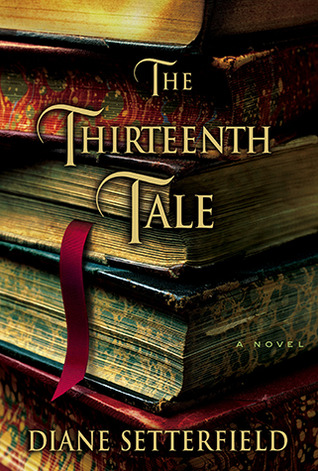 One of my resolutions for the new year is actually to read less books than I did last year. What? I mean, in books, it's always a constant climb to the top, right? Well, not exactly. I read 232 books last year. That's a lot of books. Reading that many books takes a lot of time. This year, while I'm still going to read a lot, I also want to spend more time focusing on my health and not making reading into a chore. I still want to enjoy it! That said, I still have a few reading challenges going on, and even if I cut thirty-two books out of my reading, I'd still hit two hundred, which is a pretty respectable year. I'm trying to get more challenge books out of the way earlier this year since I have a pretty solid plan for many of categories, and The Thirteenth Tale is a book for one of those categories, namely a book with characters who are twins.
One of my resolutions for the new year is actually to read less books than I did last year. What? I mean, in books, it's always a constant climb to the top, right? Well, not exactly. I read 232 books last year. That's a lot of books. Reading that many books takes a lot of time. This year, while I'm still going to read a lot, I also want to spend more time focusing on my health and not making reading into a chore. I still want to enjoy it! That said, I still have a few reading challenges going on, and even if I cut thirty-two books out of my reading, I'd still hit two hundred, which is a pretty respectable year. I'm trying to get more challenge books out of the way earlier this year since I have a pretty solid plan for many of categories, and The Thirteenth Tale is a book for one of those categories, namely a book with characters who are twins.The story here is fairly simple. Margaret Lea, our narrator and heroine, works in a small bookshop that her father owns and occasionally writes biographical snippets. When she's contacted by the revered author Vida Winters (revered by apparently everyone but Margaret, who only reads works by authors who already dead) to write Winters' biography, she's initially reluctant, but eventually agrees on the condition that Winters, who has a long history of making up stories about herself, tell the truth. What slowly unfolds is the story of a deeply dysfunctional family. A pair of twins who were probably born of incest and are left to grow up mostly feral and the attempts to put them aright, leading up to the time that a fire destroyed Winters' life--as she says, she has only been biding her time ever since it. There's a mystery lurking here, and I think it's one that the discerning reader can probably figure out. I nailed all of it down by the end, and was pretty proud of myself for it, too.
This was an interesting book. While the writing isn't fast-paced, there is plenty going on. Much of it is happening in the wings, behind the scenes, and have to be teased out. Margaret does much of this for us, over time, but it can be done before she comes to her realizations, which is a good intellectual exercise. Her view about books is kind of stuck up--she says that she just prefers old books, but it's definitely implied throughout her attitudes and actions throughout the book that she feels like people who read modern or popular fiction somehow aren't "real readers" as much as she is. But the book has much of the slow and almost Gothic feel that the books Margaret reveres have. Her favorite is Jane Eyre, something she appears to share with Winters, and Setterfield herself much like it quite a lot because its influences on this book are obvious; Margaret herself points them out at several times.
I was somewhat perplexed by the subplot of Margaret feeling so lost and adrift in her own life. I'm not a twin, so maybe it's not something that I can understand, but she feels like she's going to die because her twin died when they were both infants. It's pretty clear what happened from the beginning, though Margaret dances around spelling it out for much of the book--and her connection to Winters ultimately felt off because, as things are not what they appear, but how they really are means that what seemed like connection isn't. It's hard to say it better than that without revealing the twists, which I don't want to do, but that was how it came across to me.
Overall, I liked this. It's very atmospheric and finding a truly modern Gothic seems like a rare experience, and of course I love books about books. But some of its notes rang a little false and it also falls victim to the Gothic trope of wallowing in melodrama--but being a more recent work, it doesn't carry it off as well as its century-and-a-half-old counterparts.
3.5 stars out of 5.
No comments:
Post a Comment